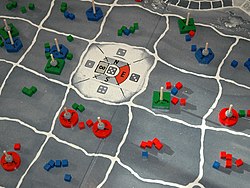
Elfenland is a German-style board game designed by Alan R. Moon and published by Amigo Spiele in German and Rio Grande Games in English in 1998.

Reiner Knizia is a prolific German-style board game designer.

El Grande is a German-style board game for 2-5 players, designed by Wolfgang Kramer and Richard Ulrich, and published in 1995 by Hans im Glück in German, by Rio Grande Games in English, and by 999 Games in Dutch. The game board represents renaissance-era Spain where the nobility fight for control of the nine regions. El Grande was awarded the Spiel des Jahres prize and the Deutscher Spiele Preis in 1996.

Alhambra is a 2003 tile-based German-style board game designed by Dirk Henn. It was originally published in Germany by Queen Games in a language-interdependent version; an English-specific version was released in North America by the now-defunct Überplay. The game is an Arabian-themed update, set during the construction of the Alhambra palace in 14th century Granada, of the 1998 stock trading board game Stimmt So!, which in turn was an update of the 1992 mafia influence board game Al Capone; the original version was subsequently released as Alhambra: The Card Game.

Wolfgang Kramer is a German board game designer.
Löwenherz is a German-style board game designed by Klaus Teuber and published in 1997 by Goldsieber in German and by Rio Grande Games in English. A revised edition, titled Löwenherz: Der König kehrt zurück in German and Domaine in English, was released in 2003 by Kosmos in German and Mayfair Games in English.

Pirate's Cove is a board game designed by Paul Randles and Daniel Stahl, originally published in Germany in 2002 by Amigo Spiele, illustrated by Markus Wagner and Swen Papenbrock. In 2003, Days of Wonder republished the game with a new graphic design from Julien Delval and Cyrille Daujean. In the game, players play pirate ship captains seeking treasure from islands and bragging rights from defeating other pirates in naval combat.

Niagara is a German-style board game designed by Thomas Liesching and published in 2004 by Zoch Verlag and Rio Grande Games.
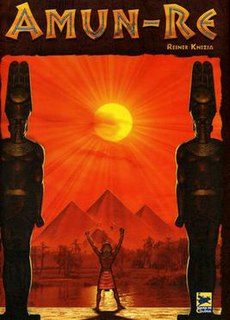
Amun-Re is a game designed by Reiner Knizia and first published in 2003 by Hans im Glück in German and in English by Rio Grande Games.

The Princes of Florence is a German board game designed by Wolfgang Kramer and Richard Ulrich published in 2000 by Alea in German and by Rio Grande Games in English. Players assume the roles of Florentine Princes who wish to design their own villas to allow artists to create great works of prestige. Through seven rounds, each containing an auction phase and two action phases, the Princes pay for landscaping, buildings, freedoms, and various services and bonuses. At the end of the seven rounds, whoever has the most Prestige Points wins.
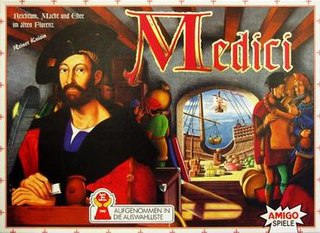
Medici is a German-style board game by Reiner Knizia. Players buy cards in an auction and match in series and in sets to end up with most points from those formations.
To Court the King is a dice-based board game for 2–5 players designed by Tom Lehmann. It was published in German by Amigo Spiele as Um Krone und Kragen in 2006, and in English as To Court the King by Rio Grande Games. The basic mechanics of rolling and re-rolling dice have drawn comparisons to the game of Yahtzee.

Agricola is a Euro-style board game created by Uwe Rosenberg. It is a worker placement game with a focus on resource management. In Agricola, players are farmers that sow, plow the fields, collect wood, build stables, buy animals, expand their farms and feed their families. After 14 rounds players calculate their score based on the size and prosperity of the household.
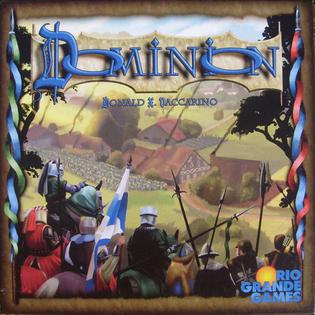
Dominion is a deck-building game created by Donald X. Vaccarino and published by Rio Grande Games. It was the first game of its kind, and inspired a genre of games building on its central mechanic. Each player begins with a small deck of cards, which they improve by purchasing cards from a common supply that varies from game to game. Cards can help the player's deck function, impede their opponents, or provide victory points.
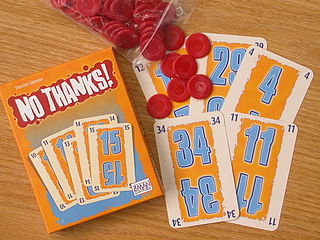
No Thanks! is a card game for three to seven players designed by Thorsten Gimmler. Originally called Geschenkt! and published by Amigo Spiele in 2004, it was translated into English by Z-Man Games.

Stone Age is a designer board game designed by Michael Tummelhofer and published by Hans im Glück in 2008. It is a development game with a Stone Age theme that involves taking control of a tribe to collect resources and build a village that has the most powerful chief.
Hansa Teutonica is a German board game designed by Andreas Steding and published by Argentum Verlag in 2009. It placed in the top 10 at the Deutscher Spiele Preis.

Terra Mystica is a Euro-style board game for two to five players designed by Helge Ostertag and Jens Drögemüller. The game was first published by Feuerland Spiele in Germany in 2012, and was later published in English and French by Zman Games and Filosofia Édition in 2013. Feuerland Spiele released a second German edition of the game in 2013.

Russian Railroads is a tile-based Euro-style board game for 2 to 4 players by Helmut Ohley and Leonhard Orgler. The game was published in 2013 by Hans im Glück Verlag. It is based on the worker placement principle, in which players can in turn distribute their available workforce in open fields in order to gain resources or other benefits. This gameplay is also used in other games of the publishing house, such as Stone Age or Egizia.
Goldrausch is a card game published in 1990 by Hans im Glück.
